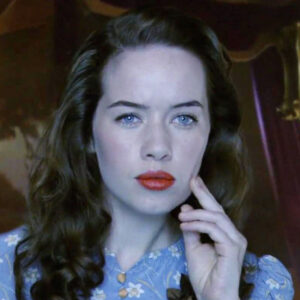Susan’s Controversial Choice in the Final Chronicle of Narnia | Talking Beasts
 Ever since The Last Battle was published in 1956, there has been ongoing discussion and controversy surrounding the uncertain fate of Susan Pevensie.
Ever since The Last Battle was published in 1956, there has been ongoing discussion and controversy surrounding the uncertain fate of Susan Pevensie.
“Sire,” said Tirian, when he had greeted all these. “If I have read the chronicle aright, there should be another. Has not your Majesty two sisters? Where is Queen Susan?”
“My sister Susan,” answered Peter shortly and gravely, “is no longer a friend of Narnia.”
The Last Battle, Ch. 12
What happened to her? What was C.S. Lewis doing? Is it sexist? In this long overdue episode, NarniaWeb podcasters weigh in on the issue. Listen and then post a comment below!
If you want to dive into this issue even further, see Devin Brown’s article, “Are the Chronicles Sexist and Racist?”
Speakers: Glumpuddle, Rilian, GymFan
Listen:
Podcast: Play in new window | Embed






I was not surprised by Susan being absent from LB. I saw that Lewis dropped a hint in HHB when Edmund said why Susan was not present at the battle in Archenland. Look at when we first meet Susan in LWW. The problem is that Susan in the movies was played by Anna Popplewell who was not like Susan. Her performance was excellent but different from the book. I am interested in what others think.
I was 12, and shocked, scared, and sad.
I don't see how her not being at that battle foreshadows "The Last Battle." She just doesn't like fighting and probably wouldn't be good at it.
I trust you know Neil Gaiman's rather dark (adult) short story "The Problem of Susan" about a woman whose youth experience mirrors Susan's exactly (lost her estranged siblings in a train crash in the 1950's) She's now a professor of children's literature, and not exactly a CS Lewis fan. I won't spoil it, it's worth a read … IMO, I really wish Jack made the same point by making Peter the estranged one, & obsessed with sports, fast cars and politics!
There's also the point that's made of always having one of the siblings in residence at Cair Paravel. Peter was off fighting giants in the north, and Lucy had stayed at CP while Susan and Ed were in Tashbaan. Susan remaining in CP is just her allowing Lucy a chance out.
I've never understood the big fuss about Susan in LB. I feel that most of the controversy is created by people who WANT to find a reason to disparage C. S. Lewis' work. He never said Susan was permanently barred from Narnia, just that – at the time of LB – she was preoccupied with more shallow things to the neglect of the important things. I thing GP put it perfectly, her focus was temporarily wrong. Lewis was not condemning those things, he was writing lines where fictional characters try to explain why their friend/sister rejected them. Furthermore, the door is left open for the tragedy she experiences to help her get her priorities straight. To sum up my feelings, this scene was never about boys, nylons, lipstick etc. It was about priorities.
Thank you SO much for addressing this topic! Ever since I first read about Rowling's perspective on Susan, it has been bugging me and I've wanted a quality response to it. I think you guys hit the nail on the head with your thoughtful comments here. Thank you!
This is my first time listening, and I will definitely subscribe now!
The issue for this is base on the human's heart – as we are on the real world. Where one heart is, is where one will end toward. Within Susan's heart, she lost her Aslan, her Narnian essence, the otherworldly spirit that connect her to Aslan (the otherworldly son) who is the door for that otherworldly country. And in Susan's heart, shadowland (materialism) has won over the favor of her heart. She is a stranger indeed to the spirit of the real Narnia.
This is a Christian message, and I do not expect non-Christian to understand it, even as one as J.K.Rowling.
And yes, J.K.Rowling (and many others) can never meet up to Lewis's concept for this and that in his story (or even writing) because Lewis, not only a believer, but he had dive deep in many theological issues and know why they are what they.
Narnia is with far more dept and relative meaning than Harry Potter because Narnia do the most inspiration in love, goodness, and purity. Harry Potter is mostly charm, charm, and more charm.
Rowling's perspective is just cabbage and more cabbage and this is why. Lewis was the greatest apologetic of the last century who defend the faith of Christianity to his last breath and the this case of Susan is one of all his apologetic reasons.
Forgive me for being rude, but though I have some delight in the Harry Potter story, I am not fool by creativity and skills… Rowling should keep her mouth shut and show some respect to a man who has done more for the Kingdom of God than she could ever be.
If critics don't like Lewis's description of Susan because they think it's silly to imply that lipstick and nylons are evil, I can sympathize. There is nothing particularly horrible about makeup, and it's perfectly legitimate to groan or roll your eyes about it being portrayed that way.
BUT… it seems like some critics aren't just rolling their eyes and groaning. They are outraged and feel that portraying Susan's interests as evil is a heinous crime. Why? It's certainly be silly to say that makeup is evil, but it's also silly to act like saying makeup is evil is evil. What's the worst case scenario if some kid reads "The Last Battle" and decides never to put on lipstick or a nylon stocking. Is her life ruined forever?
Fantastic discussion guys! When I first read the book I didn't have a strong reaction to Susan's absence. It kind of got overshadowed by everything else happening, it wasn't until I re-read it that I took more notice of it.
I remember being a little surprised when I found out this was a controversial issue, especially with the accusations of sexism. I can understand were people who think that are coming from, but I think that notion is completely unfounded. The problem with Susan isn't that she cares about those things, it's that she only cares about them. Lewis wasn't saying that she was condemned, her story isn't over, there is still hope that she could find her was into Aslan's county.
It's interesting to note that a few decades ago a nun who was disturbed by Susan's fate actually wrote an eighth chronicle, called "The Centaur's Cavern" in which Susan is somehow reconciled and brought back to Narnia.(presumably the new one.)
I first read LB when I was 10, and I wasn't surprised by Susan's absence. Of the characters from our world, she always had the hardest time believing in things she couldn't see. Even in LWW when Peter was questioning the Professor about other worlds Susan was more concerned about what they should do rather than what might be possible. And then the other books say multiple times that when in our world their experiences in Narnia fade like a dream. If she had a hard time believing when it was right in front of her, why would she continue to believe after the experience faded?
If she had actually been condemned to hell I might have thrown the book across the room, but she wasn't. Let's not forget that Susan lives. Perhaps that should be a hashtag.
Today, of all possible days, if you read the news about Prince Harry and Meghan Markle, is an interesting day to listen to this particular podcast. Because all I ever thought was that Susan probably simply got married. She certainly did not die. JK Rowling was inspired by C.S.Lewis in other ways, when she wrote her Harry Potter books, but at the time she made her remark about Susan she hadn't finished her own series, and one of the main points of her series are the challenges of growing up in a world where life isn't meant to be easy. And that is the point about Susan and the controversy. She stayed alive, probably found out that people very rarely simply get married and "live happily ever after", just like Cinderella in the fairy stories, since marriage is a whole new ballgame. Which is why I think that C.S.Lewis' ending of Last Battle serves a good purpose. Especially as Aslan told the Seven Friends of Narnia, and Tirian, that the rail accident they got involved with was based on a real accident.
I, too am surprised by the notion of controversy here. I always read this part of the story to mean that Susan had turned more towards logic, which is consistent with her character. Had I been asked to guess after reading only the first few books which Pevensie might later abandon the faith, I would likely have guessed Susan, who might become too educated or logical, or Edmund, though I feel his redemption is solid and complete.
I think it might be good to recall that C. S. Lewis, himself, left the love he had for the Lord when he was small and before his mother died. And he had his 'silly' phase all through studying with Professor Kirk, and even the beginning of his career in university, and the war. It took him a long time to return to the God he loved as a child. And he came back kicking and 'screaming' so to speak. He was such a very reluctant convert at the time of his conversion. But he grew into such an amazing apologist.
As Lewis answered, there is still a lot of time for Susan. Loosing her family in the train crash might have been such a shaking, perhaps awakening. I know that has happened to many others.
I do wonder, while I know Joy's boys were still young, but could Lewis even then see a difference between David and Douglas?
Might Lewis have written that Susan wasn't a friend of Narnia (a girl) to not point too closely to David?
We won't know the answer to this in this life. I praise the Lord that Douglas loves the Lord. I pray, and continue to pray for David, that he will meet and love his Messiah, Who has already come and died for him, to give him LIFE.
I don't think that's a big thing.
It's not like Susan turn into a bad person, she just grew up, and like some people, forgot what's really matter.
It doesn't mean that she can never go back to Narnia.
I honestly wasn't that bothered either honestly. I didn't dislike Susan's character at all, but I wasn't particularly attached to her either. I can understand, though, why a big fan of her character would be bothered by C. S. Lewis having her "turn to the dark side" without letting her present her point of view to the readers.
I was surprised when I first read it that Susan no longer believes in Narnia.
And Every time I think of the Ending of LB, I'm like, "Susan's Gonna have someone arriving at her door. "
"Hey, I'm sorry to say this to you but- your family is dead"
Susan: *Eyes wide open* "What!"
"There was a terrible Accident. your Parents, your Brothers and Sister and your Cousin were in a train, it crashed and killed them, along with your Cousin's friend, the Professor you stayed with and his friend. They're all dead. I'm sorry."
Susan: *Gasp*
That's all I can think of.
One thing I forgot to mention concerning Glumpuddle's comment about wishing Susan's absence was set up more in Last Battle. It actually is foreshadowed when Tirian has his vision of the seven friends of Narnia. Although he doesn't no who the people at the table are the reader does and can tell Susan isn't there.
No,I disagree. Because Gaiman's ideas of what happened to Susan are his alone. There are any amount of scenarios that could have described Susan's life after the rail accident. You, me and all the world can write our own. J.K.Rowling married off her heroes at the end of her series, and so she ended up writing more, which C.S.Lewis wasn't prepared to do. In the meantime, we can all have fun dreaming up all the hiccups and difficulties that would happen if Susan was a real person, and not simply a book character. Because life is one thing after another.
Exactly. Nylons, lipstick etc are really a means to an end. Usually to impress someone to get invitations and social acceptance.
… And the next day, Susan goea to the scene of the railway accident to lay down a huge wreath of flowers … and by the side of the tracks, she notices something … green and yellow rings? She approaches and reaches down to pick up a yellow ring. and … TO BE CONTINUED!
Actually, JK Rowling used that biblical verse about Where your treasure lies there is your heart, in her final story about the Deathly Hallows. Even a half a decade later people can change their point of view.
There's not a doubt in my mind that Susan was redeemed and able to go to Aslan's country in the end. Such a tragedy would have forced her to reevaluate what's important and get her priorities straight. C.S. Lewis would not have written a children's book where one of the leading characters gets shunned from Aslan's country for developing a fixation with silly things at a young age.
I'm not proud of some comments posted above, but I'll put in my 2 cents anyway:
I hated 'The Last Battle' when I read the book at the age of 12, and I bemoaned C.S Lewis for ending 'The Chronicles of Narnia' the way he did – Including how Susan's character was concluded, because she reminded me of my older siblings.
Fast forward a decade onwards, and 'The Last Battle' is still an intense read for book supposedly aimed at children.
And yet now, 'The Last Battle' has a terrible beauty about it that makes it irresistible to me; The whole concept about the end of the world, and how the good and the evil are separated before the first Narnia is frozen over – and never destroyed, just locked away – is disturbing and compelling to.
I'm glad C.S. Lewis did not send Susan to Hell, and instead, she did not enter Heaven with her family. She may not be on Aslan's side at the end of the 'Chronicles', but at least she has a chance to live like a Narnian, even if she doesn't know if there is any Narnia.
One thing about all the kerfuffle about "Susan discovering sex, nylons, lipstick and boys", readers of the Narnia Chronicles might remember the fairly momentous part Susan played in The horse and his boy. Obviously Susan thought that being grown up involved her getting married, and yes, grown up ladies before WW2 often did get married. Unfortunately, Rabadash demonstrated why that particularly grown up idea was definitely not a good idea, even if you think you are 26 and not 12 or so. Seventy years later, the mere suggestion that marriage is one's sole goal in life is considered sexist. There are people who are daft enough to want to rename midwives as midpersons, and their women patients as person patients. Susan – and C.S.Lewis – would be scratching their heads in bewilderment. Especially at being called "sexist".
I was about 22 when I read the books, but no one spoiled the books for me before hand. Mainly because my childhood friends were not overtly Christian. I remember being disappointed about Susan, and I even tried to imagine what happen to Susan afterward. There is even a file in my computer which has the first 2 chapters of a book of what happen to her. I never thought of creating a story where she get to Narnia but how she grew afterwards in this world. It would be a Susan in England book during the 1950's. I wanted my book to be like Kate D. Wiggin's books about Rebecca of Sunnybrook Farm, where Susan is taken in by Eustace's parents and evenally have a very positive effect on those around her.
From memory, I never really liked Susan in the books. I think I was nine-ish, so I felt much closer to Lucy; Susan seemed like a bossy grown-up figure (I don't have any sisters or older siblings). I felt probably almost a kind of vindictive pleasure knowing that she did not turn up in the end. I think that stemmed from her "betrayal" (as Rilian mentioned) of Narnia, for what I saw as simply wanting to "keep up with the Joneses". When I saw Anna Popplewell's portrayal in the movies, I warmed to Susan because she seemed more friendly. Now, it just seems sad.
These points are true, but I took them a step further. I was genuinely not surprise by Susan not being in LB.
thanks for the illumination on this matter, I talked without know the whole idea.
Some people stop believing, it has nothing to do with being sexists. She stopped believing all the events in her life and thus led to her being left out.
C.S. Lewis was not sexist…if he was Lucy, Polly and Jill would not have made the cut either…it’s an allegory about not everyone who believes in the beginning follows through to the end! She got sidetracked by the voice of the world. It’s nothing new! If he had written that everyone gets into “Aslan’s Country” (Heaven) he would have been going against what he believed as a Christian. He woulda been saying that it doesn’t matter what you do you all can get into heaven. Kinda like many paths all lead to heaven. Sorry but that ain’t true. C.S. Lewis based Narnia off the Bible and your walk with Jesus (Aslan)! To say yeah you can diss Him and still get into his land is unscriptural and against what C.S. Lewis believed. He wanted to warn that it’s not once saved always saved. That you can fall or walk away. So be on guard and stay close to Jesus (Aslan)!
Susan? What's the fuss?
I was wondering if anyone has ever read narniacontinued.com. I know its fan fiction but I like the way it introduces a new part of the story as to what happened to Susan.
Whoah! I never thought of that! You just figuratively blew my mind:)
I agree, I think some people just want to get riled up about stuff. I hadn't heard about the guy who said Susan was cast to hell for what not, but when they mentioned it, I just thought, "Dude, there is no way you read these books." Like, the statement is more ridiculous than Rabadash himself:)
I think Lewis is fair to his male and protagonists. Eustace was a brat in VDT and Edmund was a traitor. If you remember, Lewis criticized Eustace for the type of books he read and how he always tried to act like what he thought a grown up acted. I think Eustace and Susan have a lot in common. Both wanted to behave in a way they thought adults acted, but it was just a childish, immature perception of what true adulthood is like. Hence why Polly said that she spent all her life trying to be that age and will spend all her life trying to remain that age. Lewis subtly set that part up in LWW and mentioned that in VDT. Lewis mentions in VDT how Susan always acted the most "grown up". To quote CS Lewis,"To be concerned about being grown up, to admire the grown up because it is grown up, to blush at the suspicion of being childish; these things are the marks of childhood and adolescence. … When I became a man I put away childish things, including the fear of childishness and the desire to be very grown up."
This is a perfect example of uptight feminist (no offense to J.K. Rowling) and non-christians overreacting to something which is actually relatively simple, well done! When I first read that Susan was no longer a friend of Narnia (this was a few weeks ago), I was in shock! When I was done reading I knew there would be hope for Susan and you explained it all perfectly!
Fantastic idea! I can envision her reaching for the ring….
I was never particularly attached to Susan as a character and in the 30 odd years I've been reading the books, have never been that shocked that Susan was no longer a friend of Narnia. Remembering that in LWW, she stated more than once that they should go back, and in PC, she was the last one to see Aslan. She was never really invested in Narnia as much as the others were. Lewis never condemned her, she was just left behind. I'd like to think that she made her own way to Narnia later on.
The ironic thing is that both Phillip Pullman and J.K. Rowling's fantasy novels are heavily influenced by C.S. Lewis and J.R.R. Tolkein's fantasy works (they almost single-handedly invented the modern fantasy genre). So while they are negative about this passage, their success is almost dependent on Jack's literature.
Exactly, they find something to criticize because they want to find something.
Very well put, and this is the heart of the matter. It's not the feminist stuff but the idea of rules in general with which people seem to disagree. Some would not be happy until there were no rules, restrictions, guidelines, limits or boundaries.
That would be Philip Pullman, an atheistic author who wrote the "His dark materials", whose own idea of heaven in that trilogy sounds more like purgatory, and a bit of a confidence trick pushed onto people by "The establishment", ie. the Church of England, plus RC forebears and others, by a very doddery "Ancient of Days", in thrall to an evil archangel.
To a point, yes. But in that infamous interview, JK Rowling, I think, was caught "on the hop". She admitted she hadn't actually finished "The last battle", maybe she never started reading it in the first place. Up until Tirian notices Susan's absence, that book is rather sad and depressing, compared to the other books. Defeat is sometimes hard to swallow. But by leaving Susan's fate open-ended, C.S.Lewis made the book far more alive and far more valuable than by simply giving it the traditional fairytale ending that somehow people keep believing in, even when they say they are too grown-up for fairy tales.
Hey did y’all know that today is C S Lewis’s birthday?! This calls for a special something!
I find all of these comments to be redundant…the real question is how C.S. Lewis's work relates to issues of European Geo-Political alliances especially following WWII
I'm sure there will be plenty to talk about Susan Pevensie and her 'expulsion' in The Last Battle, but Lewis once wrote to a fan that Susan's story isn't finished yet and that she has a chance to reunite with her family in Aslan's country, but unfortunately Lewis died before he could get to it.
There's an interesting article concerning the fate of Susan, and her similarities to Orual from Til we have Faces (another CS Lewis book)
Though Susan and Orual are wholly different (Susan is beautiful and loved, Orual is ugly and unloved). They both share a similarity with their relationships with their younger sisters (Lucy, Psyche), a mysterious glimpse of a divine power (Aslan, Eros/Aphrodite), and both tend to show prideful attitudes toward their younger sisters by acting like 'grown-ups' toward them, treating them condescendingly like children. In the article, it explains how Orual's redemption can be Susan's salvation. Susan's fate is unknown, but Orual is reunited with her sister in the afterlife after learning of her flaws and mistakes and her mistreatment of her, Orual is forgiven.
Here is the article for
https://library.taylor.edu/dotAsset/650c80c6-a0d4-4a78-ac76-591dd603bcdb.pdf
Perhaps Lewis Sarficed Susan as a character to redeem the reader.
Susan wasn't sacrificed, even as a character. Susan is a sort of everygirl, really. Having left her family voluntarily to pursue other goals and interests she will have time to choose and understand what her priorities are, to prize the time she spent with her Pevensie family and what her Narnian experiences should have taught her about society and life.
For me this seems more about the relative value Lewis placed on imagination over material reality. Reading a biography of Lewis illustrates how he spent most of his life cocooned in a conceptual world built from his reading. It was where he went when that material world of “nylons & lipsticks” became intolerable: finding comfort as a lonely child when Warnie left home; a retreat as a bereaved schoolboy far from home, a wounded survivor of the trenches in WW1 who lost his room mate. The phrase he used himself was “making a treaty with reality” which allowed him to keep it at bay. Even his adult life at Oxford existed mostly in a bubble removed from that material world, shielded by the world of academia and the strange mother / lover relationship he experienced with Mrs Moore. The difference between Lewis and Tolkien was that Tolkien was married with children and had to deal with those realities while Lewis was protected from them. It was only in the 1950’s that reality broke that treaty and began smashing into his conceptual haven, with his rejections at Oxford, instability and financial concerns at the Kilns and the bubble-bursting arrival of Joy. Narnia could perhaps be seen as the embodiment of his conceptual haven and it’s easy to consider that material reality (as represented by Susan) wasn’t at all welcome there.
Most of the comments from both the speakers and listeners do not reflect my own thoughts concerning Susan, so I'm going to go out on a limb here. I was just a kid when I read The Lion, the Witch, and the Wardrobe, maybe 9; I can't remember. I don't recall even being aware that it was the first in a series until I was grown. So, I didn't read the rest of the chronicles until my early 20s.
From that first reading, Susan was my favorite character, followed closely by Peter. I related to her because I am the oldest in my family with two younger siblings. Also, I've always been more of a feminine girl than a tomboy, and Susan struck me as the former and Lucy the latter. I could see her flaws but I also understood them, because as the oldest I would naturally become the "second mother" when the adults weren't around. That tends to come with some anxiety for everyone's welfare, a bit of bossiness, and in a broken home like mine was, a subconscious effort to become the missing parent, which leads to growing up too fast. There was also a lot of emphasis in my family from the adults to be pretty; it came with praise, as though it were a virtue. I understood why Susan was the way she was, and I loved that someone like me got to be a Queen of Narnia.
So, years later, when I again read LWW along with the rest of the chronicles, I enjoyed seeing Susan return to Narnia in PC and seeing her as a beautiful full-grown queen in HHB. I didn't mind that she didn't go into battles, because I don't like fighting and killing either. We both have a reputation for gentleness. But I've always been fascinated with archery, and I loved that Susan was the best archer in Narnia. In other words, reading the other chronicles in which Susan played a part only made me love her more.
When I read The Last Battle, I immediately zeroed in on what was said about Susan, and I was devastated. Truly sad and depressed. I imagined her getting a telegram or a phone call that her entire family plus some other friends and acquaintances were all dead. I remember being furious with C.S. Lewis for leaving her in such a state. I thought it was truly cruel and uncalled for in a children's book. I also thought it was completely unrealistic. How could someone spend approximately 15 years in a magical country, growing up and reigning as a monarch, along with fellow witnesses, return to that land again for a time later on, and then just forget it ever happened? Furthermore, I saw absolutely no foreshadowing of Susan's "fall from grace." Of course, she had flaws, but so did everyone else, even Lucy.
It's important to point out that I had no idea of any criticism of Lewis being sexist, so my opinion was entirely my own when, still reeling from Susan's situation and trying to process it, I looked back at the chronicles and was struck that it did seem to me that the author had something against beautiful, feminine women and a preference for tomboys. The fact that the most beautiful and feminine of all the child visitors to Narnia was the one who was left out at the end, the fact that the White Witch and the Lady of the GK were physically beautiful, and the fact that the more lauded girls came off to me as more tomboyish (like Lucy) led me to believe that C.S. Lewis did have some kind of fear or distaste for beautiful women.
I understand that there is evidence against this, as many have pointed out; particularly well written was the Devin Brown article about this subject. I just wanted to post my experience because I can understand how people could come to the conclusion that Lewis was somehow sexist, because that was my own initial reaction. I'm still not entirely convinced that he wasn't in some way "threatened" by femininity. I do believe that he intended to address Susan's fate based on a quotation I read somewhere in which he mentioned a desire to "tie up loose ends" in the chronicles. What bigger loose end is there than Susan? I regret that he died before he was able to do this, leaving those of us who love her without closure.
I think that Lewis mentioned in his own letters that it was still possible that Susan might have been saved. This would have been outside of the story of The Last Battle, but it was certainly possible. In order to be consistent with "once a King or Queen of Narnia, always a king or queen" she could not have been permanently lost. I think Lewis would have followed through keeping his own ideas with no contradictions– even with a fictional character.